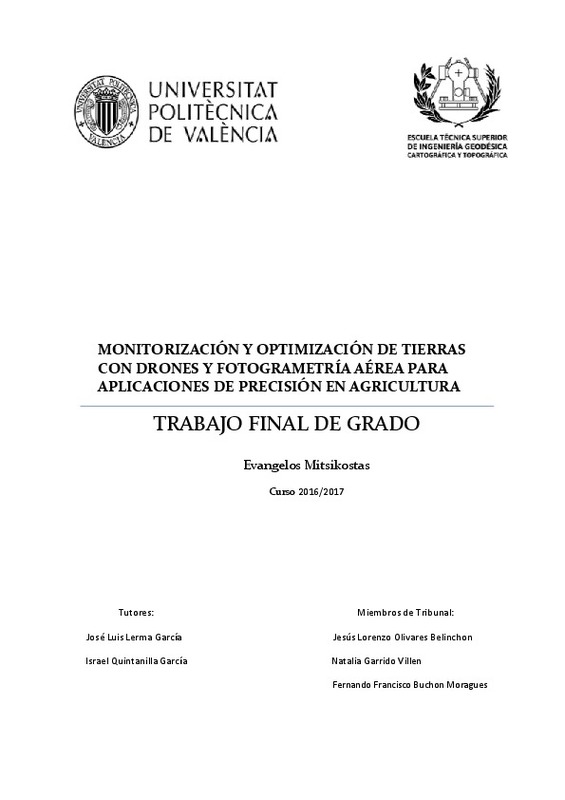JavaScript is disabled for your browser. Some features of this site may not work without it.
Buscar en RiuNet
Listar
Mi cuenta
Estadísticas
Ayuda RiuNet
Admin. UPV
Monitorización y optimización de tierras con drones y fotogrametría aérea para aplicaciones de precisión en agricultura
Mostrar el registro sencillo del ítem
Ficheros en el ítem
| dc.contributor.advisor | Lerma García, José Luis
|
es_ES |
| dc.contributor.author | Mitsikostas, Evangelos
|
es_ES |
| dc.coverage.spatial | east=-0.4337304000000586; north=39.1925693; name=46680 Algemesí, València, Espanya | |
| dc.date.accessioned | 2017-09-04T15:13:52Z | |
| dc.date.available | 2017-09-04T15:13:52Z | |
| dc.date.created | 2017-07-19 | |
| dc.date.issued | 2017-09-04 | es_ES |
| dc.identifier.uri | http://hdl.handle.net/10251/86353 | |
| dc.description.abstract | [ES] El proyecto consiste en aplicar una tecnología específica para la rama de agricultura de precisión. La tecnología como todos sabemos, sufre una enorme evolución y tenemos que ser capaces de demostrar que somos los mejores en usarla. En concreto, en mi profesión he decido de seguir la rama de agricultura de precisión y esto porque es un nuevo aspecto de mi carrera. El objetivo de este proyecto, es proporcionar unos resultados óptimos para la mejora de producción para los agricultores. Con manera de que ellos reducirán los fertilizantes y los usos químicos en sus productos y tendrán muchos beneficios económicos. El trabajo se desarrolló para la zona de Algemesí en la Comunidad Valenciana en 17 de Octubre en 2016. El vuelo se realizó con un Multicóptero, modelo DJI F-450 UAV (UnmannedAerialVehicle) o VANT (Vehículo Aéreo No Tripulado), con una cámara Multiespectral y RGB llamada MicraSense para poder sacar el índice de vegetación NDVI (Normalized Difference Vegetation Index). Los resultados que queremos presentar son unos modelos de MDS (Modelo Digital de Superficie), MDT (Modelo Digital de Terreno) y un Ortomosáico. Sobre ello, he tomado unos puntos de control con un GPS de Leica para poder georreferenciar el Ortomosáico. Realice con los puntos de apoyo una imagen junto con el Google Maps del área para poder mostrar que los puntos tomados en el área se diferencian. El proceso de los datos se realizó en el Departamento de Topografía y en mi casa utilizando dos diferentes ordenadores. El Software que utilice para procesar los datos fue el Pix4D Mapper Pro. Estos hechos sugieren que los instrumentos utilizados en este estudio representan una solución rápida, fiable y eficiente para la evaluación de los cultivos para aplicaciones agrícolas. | es_ES |
| dc.description.abstract | [EN] The project consists of applying a specific technology for the precision agriculture branch. Technology as we all know undergoes enormous evolution and we have to be able to demonstrate that we are the best in using it. Specifically, in my profession I have decided to follow the branch of precision agriculture and this because it is a new aspect of my career. The objective of this project is to provide optimum results for improved production for agriculturists. So that they will reduce the fertilizers and the chemical uses in their products and will have many economic benefits. The work was developed for the area of Algemesí in the Valencian Community on 17 of October of 2016. The flight was realized with a Multicopter, model DJI F-450 UAV (Unmanned Aerial Vehicle) or VANT (VehículoAéreo No Tripulado), with a Multispectral and RGB camera called MicraSense to be able to extract the index of vegetation NDVI (Normalized Difference Vegetation Index). The results that we want to present are models of DSM (Digital Surface Model), DTM (Digital Terrain Model) and an Orthomosaic. On this, I have taken some control points with a Leica GPS to be able togeoreferentiate the Orthomosaic.I made with the points of control an image along with the Google Maps of the area, to be able to show that the points taken in the area they differ. The data processing was done in the Department of Surveying and in my house using two different computers. The software used to process the data was the Pix4D Mapper Pro. These facts suggest that the instruments used in this study represent a fast, reliable and efficient solution for the evaluation of crops for agricultural applications. | es_ES |
| dc.format.extent | 103 | es_ES |
| dc.language | Español | es_ES |
| dc.publisher | Universitat Politècnica de València | es_ES |
| dc.rights | Reserva de todos los derechos | es_ES |
| dc.subject | Photogrammetry | es_ES |
| dc.subject | SFM | es_ES |
| dc.subject | DTM | es_ES |
| dc.subject | Agriculture | es_ES |
| dc.subject | Statistics | es_ES |
| dc.subject | Fotogrametría | es_ES |
| dc.subject | MDT | es_ES |
| dc.subject | Agricultura de precisión | es_ES |
| dc.subject | Estadística | es_ES |
| dc.subject | Sector agrario | |
| dc.subject | Drones | |
| dc.subject | Precision farming | |
| dc.subject.classification | INGENIERIA CARTOGRAFICA, GEODESIA Y FOTOGRAMETRIA | es_ES |
| dc.subject.other | Grado en Ingeniería en Geomática y Topografía-Grau en Enginyeria Geomàtica i Topografia | es_ES |
| dc.title | Monitorización y optimización de tierras con drones y fotogrametría aérea para aplicaciones de precisión en agricultura | es_ES |
| dc.type | Proyecto/Trabajo fin de carrera/grado | es_ES |
| dc.rights.accessRights | Abierto | es_ES |
| dc.contributor.affiliation | Universitat Politècnica de València. Escuela Técnica Superior de Ingeniería Geodésica, Cartográfica y Topográfica - Escola Tècnica Superior d'Enginyeria Geodèsica, Cartogràfica i Topogràfica | es_ES |
| dc.contributor.affiliation | Universitat Politècnica de València. Departamento de Ingeniería Cartográfica Geodesia y Fotogrametría - Departament d'Enginyeria Cartogràfica, Geodèsia i Fotogrametria | es_ES |
| dc.description.bibliographicCitation | Mitsikostas, E. (2017). Monitorización y optimización de tierras con drones y fotogrametría aérea para aplicaciones de precisión en agricultura. Universitat Politècnica de València. http://hdl.handle.net/10251/86353 | es_ES |
| dc.description.accrualMethod | TFGM | es_ES |
| dc.relation.pasarela | TFGM\65513 | es_ES |
Este ítem aparece en la(s) siguiente(s) colección(ones)
-
ETSIGCT - Trabajos académicos [494]
Escuela Técnica Superior de Ingeniería Geodésica, Cartográfica y Topográfica






